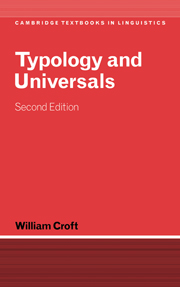Book contents
- Frontmatter
- Contents
- List of figures
- List of tables
- Preface to the second edition
- Preface to the first edition
- List of abbreviations
- List of symbols
- 1 Introduction
- 2 Typological classification
- 3 Implicational universals and competing motivations
- 4 Grammatical categories: typological markedness, economy and iconicity
- 5 Grammatical hierarchies and the semantic map model
- 6 Prototypes and the interaction of typological patterns
- 7 Syntactic argumentation and syntactic structure in typology
- 8 Diachronic typology
- 9 Typology as an approach to language
- List of references
- Map of languages cited
- Author index
- Language index
- Subject index
8 - Diachronic typology
Published online by Cambridge University Press: 05 June 2012
- Frontmatter
- Contents
- List of figures
- List of tables
- Preface to the second edition
- Preface to the first edition
- List of abbreviations
- List of symbols
- 1 Introduction
- 2 Typological classification
- 3 Implicational universals and competing motivations
- 4 Grammatical categories: typological markedness, economy and iconicity
- 5 Grammatical hierarchies and the semantic map model
- 6 Prototypes and the interaction of typological patterns
- 7 Syntactic argumentation and syntactic structure in typology
- 8 Diachronic typology
- 9 Typology as an approach to language
- List of references
- Map of languages cited
- Author index
- Language index
- Subject index
Summary
Languages do not occur in static or stable states. All languages exhibit some degree of grammatical variation, and they change over time; in fact, much synchronic variation represents language change in progress. Changes in linguistic structure are changes in the grammatical properties that enter into one or more of the cross-linguistic patterns described in the preceding chapters. This fact suggests two extensions of typology. First, if language types fall into universal cross-linguistic patterns, then it is worth investigating if the cross-linguistic patterns also govern changes in language type. Second, it should be possible to classify typologically the linguistic changes themselves, and look for relationships among linguistic processes in the same way that typologists seek relationships among linguistic states. This latter process has been especially fruitful and has led to intensive study of a family of associated language processes called grammaticalization.
The dynamicization of synchronic typology
We may return to the foundations of synchronic typology in order to see its consequences for language change. Synchronic typology is founded on the typological classification of logically possible linguistic types (chapter 2). Once this is established, one then constructs a language sample in order to determine which of the logically possible language types are actually attested in the languages of the world, and formulates universals (implicational universals, typological markedness, prototypes, conceptual distance, formal complexity, etc.) that restrict human languages to the actually occurring types. These universals are then explained in external terms.
- Type
- Chapter
- Information
- Typology and Universals , pp. 232 - 279Publisher: Cambridge University PressPrint publication year: 2002



